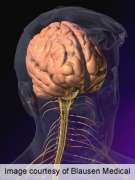Use of hormone therapy within five years of menopause is associated with a reduction in the risk of Alzheimer's disease, according to a study published online Oct. 24 in Neurology.
(HealthDay)—Use of hormone therapy (HT) within five years of menopause is associated with a reduction in the risk of Alzheimer's disease (AD), according to a study published online Oct. 24 in Neurology.
Huibo Shao, from Weill Cornell Medical College in New York City, and colleagues examined whether the timing or type of HT impacts its association with AD. A cohort of 1,768 women from the Cache County Study who provided a detailed history of age at menopause and use of HT were followed between 1995 and 2006. One hundred seventy-six women developed incident AD during this period.
The researchers found that use of any type of HT within five years of menopause was associated with a significant 30 percent reduction in the risk of AD, particularly if HT was used for 10 years or more. There was no reduction in AD risk seen for women who initiated HT five years or more after menopause. Women who began "opposed" estrogen-progestin compounds within three years preceding the Cache County Study baseline had an increased risk of AD (adjusted hazard ratio, 1.93; 95 percent confidence interval, 0.94 to 3.96), which was similar to that reported in randomized trial participants assigned to opposed HT.
"Association of HT use and risk of AD may depend on timing of use. Although possibly beneficial if taken during a critical window near menopause, HT (especially opposed compounds) initiated in later life may be associated with increased risk," the authors write. "The relation of AD risk to timing and type of HT deserves further study."
More information:
Abstract
Full Text (subscription or payment may be required)
Editorial (subscription or payment may be required)
Journal information: Neurology
Copyright © 2012 HealthDay. All rights reserved.



















